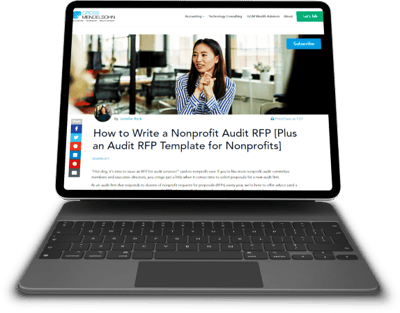I’ve heard it more than once at the conclusion of a nonprofit organization’s RFP process: “We really liked your CPA firm, but ... we went with another firm whose audit services cost less.”
Hhmm, sounds good for the nonprofit’s pocketbook, right? Well, maybe — if the CPA firm they hired can perform a high-quality, efficient audit . But more often than not, when a nonprofit goes with the cheapest bidder, it doesn’t end well. Those nonprofits find out the hard way that “cheaper” doesn’t always mean “better” when it comes to audit services.
It goes without saying that nonprofits have limited budgets and spend the majority of their resources on mission-related activities. Going with a cheap audit, at least on the surface, appears to be a way to save money. But it’s essential that you look at factors other than cost when selecting a new audit firm.
3 Reasons Why a Cheap Audit Could End Up Costing More In the Long Run
1. The audit firm’s lack of nonprofit expertise causes them to miss errors
A recent study conducted by Jeffrey Burks, associate professor of accountancy at the University of Notre Dame, revealed that nonprofits make accounting errors at a relatively high rate compared to for-profit companies. He attributes this variance to nonprofit organizations’ tendency to devote fewer resources to administrative costs, one of which is the internal accounting function, compared to their for-profit counterparts.
Let’s look at one scenario where the lack of internal accounting expertise, combined with the outside audit firm’s lack of nonprofit specialization, led to a costly mistake. The relatively inexperienced bookkeeper at the nonprofit failed to correctly accrue wages. The nonprofit’s audit firm did not catch the mistake. The oversight resulted in an error that cost the nonprofit $100,000.
When your auditors lack significant experience with nonprofits, they are more likely to miss mistakes in your organization’s books. Some of those mistakes are minor, yet others can be costly.
2. They don’t understand the nuances of nonprofit accounting and auditing, and therefore don’t advise you how to be a stronger organization
As one of our past blog posts explains, there are differences between nonprofit and for-profit accounting and auditing. In other words, not all audits are the same.
One of our nonprofit clients had their fundraising opportunities in jeopardy because their past audit firm didn’t handle the organization’s allocations correctly. This resulted in the organization’s program expense percentage being too low, which could have really hurt their fundraising efforts. When we became the organization’s auditor, we fixed their allocations so their program service expenses were no longer understated. This put the organization in a better fundraising position.
When you evaluate a new audit firm, it’s important to consider whether that firm understands the nuances of nonprofit accounting and auditing. Your auditor should help you with nonprofit-specific tax requirements, proper reporting and transparency and controls. Nonprofit organizations must follow specific nonprofit accounting procedures in order to provide accurate records of how money is received and spent. Is your audit firm advising you on those matters?
3. They aren’t efficient
If your audit firm doesn’t regularly play in the nonprofit auditing sandbox, they will most likely be inefficient. They don’t have streamlined processes in place simply because they don’t perform many nonprofit audits. This can result in a lot of interruptions of your time and your staff.
How to Evaluate Your Next Audit Firm
Your budget is most likely tight, but there are steps you can take to make sure your audit firm is qualified to handle your nonprofit’s audit.
-
Check client references. Really listen to what the firm’s clients have to say about their experience. Are the auditors easy to work with? Do they know nonprofit accounting inside and out? Have they learned new things from their audit firm?
-
Ask your circle of trusted advisors for recommendations. Bankers, for example, see countless financial statements from various audit firms and probably know how different firms compare to others in terms of quality and nonprofit expertise.
- Make sure your audit RFP is designed to scope out potential firms. Want to freshen up your audit RFP? Here's some guidance on how to write your next RFP, along with a downloadable RFP.
-
Take advantage of a free consultation to “interview” a potential new audit firm. Do you have good chemistry with them? Did you learn something new and insightful from talking with them?
-
Do your best to look beyond price. If you receive proposals from five firms, for instance, ask yourself which one you would most want to hire if price weren’t an issue. Is that firm the cheapest? Probably not.
-
If you really like a particular audit firm but their proposed price is too high for your budget, talk with them. There is a chance you can negotiate a little on price. Quite possibly, that audit firm wants to work with you just as much as you want to work with them. It can’t hurt to ask.
-
Evaluate how your potential auditor spends his or her time when it comes to marketing and being out in the community. Are they spending time in the nonprofit arena? Do they give presentations, write articles and attend conferences for nonprofits? Do they have a Nonprofit Resource Library on their website?
Is Your CPA Firm Looking Out for You?
Make sure your audit firm is looking out for your organization. One of our nonprofit clients, for example, came to us after their prior audit firm failed to help them with tens of thousands of dollars in IRS penalties. As their new CPA firm, we were successful in getting the penalties abated so they didn’t have to pay the penalties, which were substantial.
Invest In Your Nonprofit’s Future
Don’t undervalue the importance of sound financial accounting, reporting and advice. Paying a little more for a high-quality CPA firm with real nonprofit experience might cost you much less in the long run. An investment in your organization’s financial health is an investment in your nonprofit’s mission and future.
Need Help?
For help with your next audit, contact us online or call 800.899.4623.


